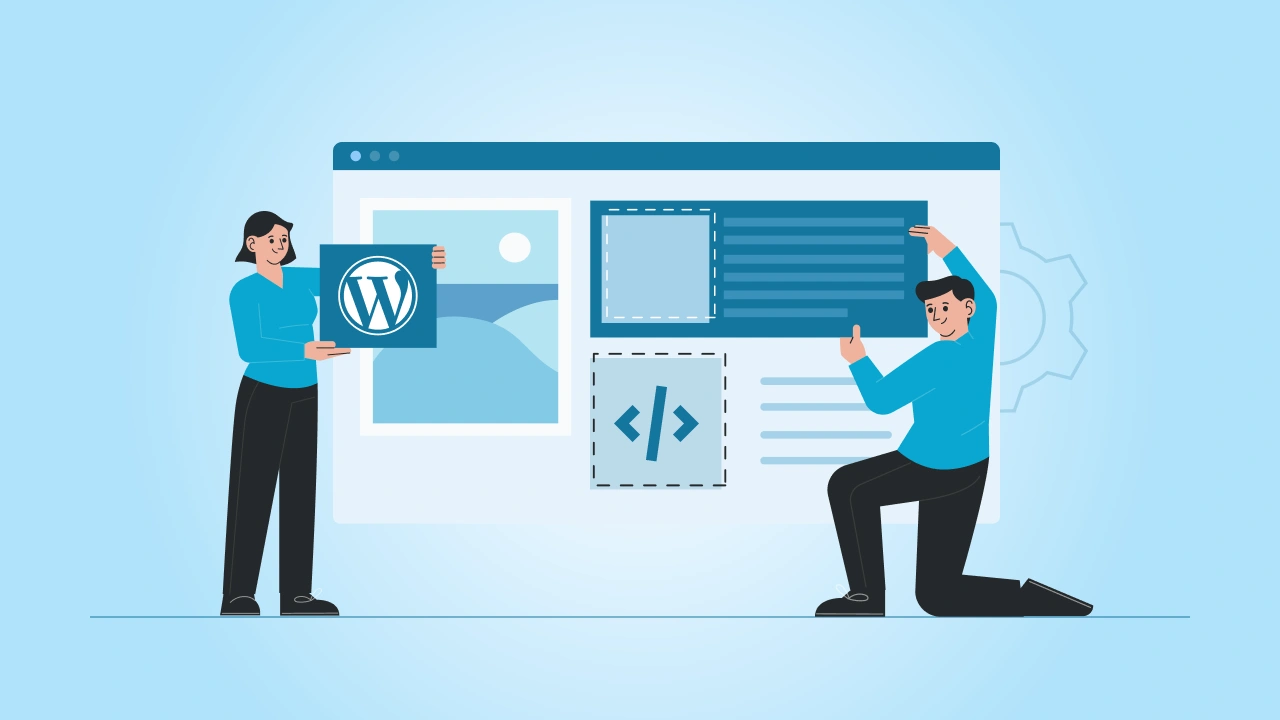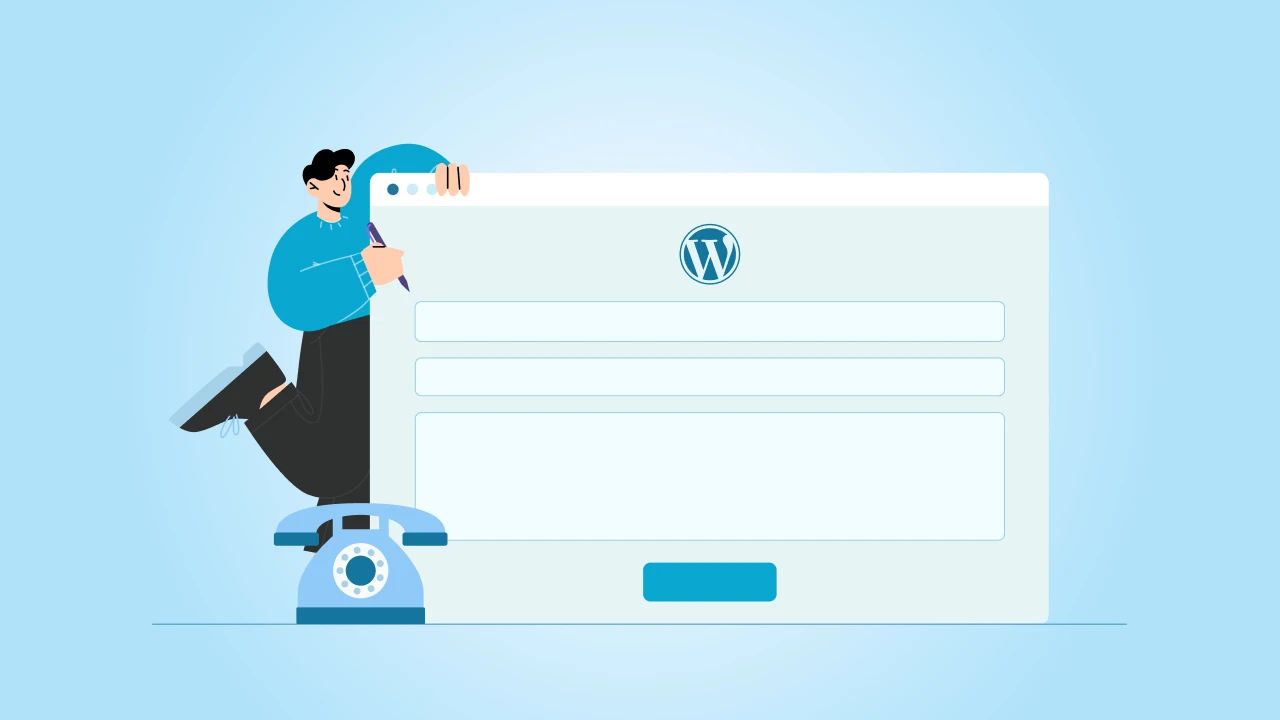So, you are ready to build a website, but now you are stuck on a big decision—which CMS (Content Management System) should you use?
If you have done any research, you must have probably seen the same three names pop up over and over again:
- WordPress – The most popular choice, known for its simplicity and massive plugin library.
- Joomla – A solid middle ground between flexibility and ease of use.
- Drupal – The powerhouse for developers who need full control over their site.
When you first look at them, all 3 seem like great choices. Well, you might even think–what difference does it make? Let’s just pick anyone.
But here’s the thing—choosing the wrong CMS can be a huge headache. You don’t want to spend weeks setting up your site, only to realize later that it’s too complex to manage or doesn’t have the features you actually need to manage or run your business.
So, how do you pick the right one?
This guide is here to cut through the confusion and give you a clear, no-nonsense comparison of these three platforms. We are not just going to list features—you will get real insights on:
- Which CMS is best for different types of websites
- How do they compare in ease of use, flexibility, and security
- The biggest pros and cons of each platform
- A straightforward answer to which one is right for you
By the end, you will have a solid understanding of which CMS fits your needs—without wasting time on unnecessary tech jargon.
⏰ 60-Second Summary
- WordPress, Joomla, and Drupal are three of the most popular CMS platforms, each designed for different website needs.
- WordPress is the most user-friendly and widely used, ideal for blogs, small businesses, and eCommerce.
- Joomla offers more flexibility and built-in features, making it a great choice for structured business websites.
- Drupal is the most powerful and secure but requires technical knowledge, best suited for large-scale, high-traffic sites.
- Each CMS has its own pros and cons in ease of use, security, customization, SEO, and cost, so choosing the right one depends on your goals.
- No matter which platform you use, regular updates, security measures, and good content strategy are key to a successful website.
A Quick Look at WordPress vs Joomla vs Drupal
Before we get into the nitty-gritty details, let’s start with a big-picture overview of these three content management systems. Each one has its strengths and quirks, and understanding their core purpose will make it easier to decide which one fits your needs.
1. WordPress – The Go-To CMS for Most Websites
If you have ever Googled “how to build a website,” or “how to build a WordPress website” you most definitely would have come across WordPress. It powers over 40% of all websites, making it by far the most popular CMS out there.
What Makes WordPress Popular?
- Super beginner-friendly—you don’t need to be a tech expert to get started.
- Tons of themes and plugins to customize your site however you want.
- Great for blogs, small businesses, portfolios, and eCommerce (with WooCommerce).
Where WordPress Struggles
- Because it’s so widely used, it’s a target for hackers— WordPress security requires extra effort.
- Heavily dependent on plugins for advanced features, which can slow down your site.
- Not the best choice for complex, large-scale websites that need advanced customization.
👉 Best For: Bloggers, small businesses, entrepreneurs, and anyone who wants a website up and running quickly.
Our experts at cmsMinds specialize in WordPress, Joomla, and Drupal development.
2. Joomla – The Balanced Middle Ground
Joomla is like the middle child of CMS platforms—it’s more powerful than WordPress but not as complex as Drupal. It has a loyal user base but doesn’t get as much attention as the other two.
Why Some People Prefer Joomla
- More built-in flexibility than WordPress, without relying too much on extensions.
- Better multilingual support right out of the box (no extra plugins needed).
- A good mix of ease-of-use and customization, making it great for business websites.
The Downsides of Joomla
- The learning curve is steeper than WordPress—not beginner-friendly.
- Fewer themes and extensions compared to WordPress, making customization harder.
- The admin dashboard can feel confusing if you are not tech-savvy.
👉 Best For: Businesses, membership sites, and users who want more flexibility than WordPress but aren’t ready for Drupal’s complexity.
3. Drupal – The Developer’s Dream (or Nightmare?)
Drupal is the powerhouse CMS that can handle massive, complex websites with ease. But here’s the catch—you need some technical skills (or a dedicated Drupal developer) to make the most of it.
Why Big Organizations Love Drupal
- Highly customizable—you have full control over how your site functions.
- Extremely secure, making it the go-to choice for government websites and large enterprises.
- Designed to handle large amounts of content and traffic without breaking a sweat.
What Makes Drupal Challenging?
- Not beginner-friendly—expect a learning curve if you are not a developer.
- The theme and module ecosystem is smaller compared to WordPress and Joomla.
- Making even simple changes can require custom coding.
👉 Best For: Large organizations, government sites, universities, and developers who need full control over their website’s structure.
So, Which One Sounds Like the Best Fit for You?
Now that you have a general idea of what WordPress, Joomla, and Drupal offer, the next step is to compare them head-to-head in key areas like ease of use, security, customization, and SEO.
WordPress vs. Joomla vs. Drupal (Head-to-Head Comparison)
Now that we have covered the basics, it’s time for a real comparison. Instead of just listing features, let’s focus on the things that actually matter when building and managing a website.
- Ease of Use – How beginner-friendly is it?
- Customization & Flexibility – How much control do you have over design and functionality?
- Security & Maintenance – How safe is your site from hackers and data breaches?
- Performance & Scalability – Can it handle large amounts of traffic and content?
- SEO & Marketing – Which CMS gives you the best chance to rank on Google?
- Cost & Development Resources – How much does it cost to build and maintain?
Let’s get started.
1. Ease of Use – How Beginner-Friendly Is It?
- Pros: Easy setup, intuitive interface, massive online community for support.
- Cons: Some customization requires plugins, which can add complexity over time.
- Pros: More flexibility than WordPress without requiring coding.
- Cons: The learning curve is steeper, and the admin dashboard isn’t the most user-friendly.
- Pros: Full control over site structure, no unnecessary bloat.
- Cons: Requires technical knowledge to build and manage.
WordPress: The Most User-Friendly Option
WordPress was built with non-tech users in mind, making it the easiest CMS to pick up. The dashboard is simple, and installing themes or plugins is a one-click process. If you know how to use Microsoft Word, you can manage a WordPress site.
Joomla: A Bit More Complex, But Still Manageable
Joomla offers more flexibility than WordPress, but that comes with added complexity. The admin panel has more options and can feel overwhelming for beginners. However, once you get the hang of it, Joomla provides more built-in features without needing as many extensions.
Drupal: Built for Developers, Not Beginners
Drupal is not beginner-friendly at all. If you don’t have coding skills, expect to spend some time learning or hiring a developer. The backend is powerful but not intuitive for non-technical users.
🏆 Winner WordPress: If you want to set up a website quickly without much hassle, WordPress is the clear choice.
2. Customization & Flexibility – How Much Control Do You Have?
- Best for: Quick website setups with easy-to-use themes and page builders.
- Best for: Websites that need advanced content control without diving into full-on coding.
- Best for: Large-scale sites where structure and security are priorities.
WordPress: Customizable, But Plugin-Dependent
WordPress has thousands of free and paid collection of WordPress themes and plugins, but heavy reliance on third-party add-ons can create performance and security issues. Advanced customization often requires custom coding or WordPress page builders like Elementor.
Joomla: More Built-In Flexibility
Joomla strikes a balance—it has more customization options than WordPress but isn’t as complex as Drupal. It offers better Drupal multilingual support and has a stronger user access system, making it ideal for membership sites.
Drupal: Maximum Customization, But Requires Coding
Drupal gives you unlimited customization possibilities. Want a highly structured site with custom content types? Drupal is perfect for that. But here’s the catch—you will need a developer to build and maintain it.
🏆 Winner Drupal: If you need complete control, Drupal is the most powerful option. For a balance between flexibility and ease of use, Joomla is a strong contender.
3. Security & Maintenance – Which CMS Keeps Your Site Safe?
- Pros: Easy WordPress security plugins available, frequent updates.
- Cons: High risk if not maintained properly.
- Pros: Better built-in security features than WordPress.
- Cons: Still requires manual updates and proper setup.
- Pros: Strongest security features, trusted by high-profile organizations.
- Cons: Requires a developer to implement and maintain security best practices.
WordPress: Most Targeted by Hackers
Because WordPress is so popular, it’s also the biggest target for cyberattacks. Security depends heavily on regular updates and using the right plugins. Many vulnerabilities come from outdated themes and plugins, not WordPress itself.
Joomla: More Secure Than WordPress, But Still Requires Maintenance
Joomla is less targeted than WordPress, making it slightly more secure out of the box. It also has stronger user permissions, which helps for membership-based sites. However, updates and security patches still need to be managed regularly.
Drupal: The Most Secure CMS
Drupal is the go-to CMS for government websites and enterprises that require high-level security. It has built-in security features that reduce vulnerabilities, and security patches are tightly controlled by the Drupal community.
🏆 Winner Drupal: If security is a top concern, Drupal is the safest choice. Joomla is a good middle-ground, while WordPress requires more maintenance to stay secure.
4. Performance & Scalability – Which CMS Can Handle Growth?
- Best for: Small businesses, blogs, and moderate-sized websites.
- Best for: Medium-sized business sites that need structured content management.
- Best for: Enterprise websites, universities, government organizations.
WordPress: Good for Small to Medium Sites
WordPress performs well if optimized correctly, but plugin overload and shared hosting can slow it down. Large-scale sites need caching, a CDN, and server optimizations to keep performance high.
Joomla: More Structured Performance
Joomla has a more optimized core, making it better suited for medium-sized websites that need scalability without too much tweaking. However, high-traffic sites still need good hosting and caching.
Drupal: Built for Large-Scale Performance
Drupal is the most scalable option, designed to handle massive traffic and complex data structures. It’s the best choice for high-traffic websites, government portals, and enterprise applications.
🏆 Winner Drupal: If you are planning for long-term growth, Drupal can scale the best. For mid-sized sites, Joomla is a good alternative.
SEO, Marketing, & Cost Breakdown – Which CMS is the Best Investment?
At this point, we have compared WordPress, Joomla, and Drupal based on usability, security, and scalability. But what about SEO, digital marketing, and the actual cost of running a website?
Let’s break it down!
1. SEO & Marketing – Which CMS Helps You Rank on Google?
SEO (Search Engine Optimization) is super important for driving traffic to your website. While all three CMS platforms allow you to optimize your site for search engines, some make it easier than others.
WordPress: The Best CMS for SEO (With the Right Plugins)
WordPress is built for content and has the strongest SEO ecosystem. Plugins like Yoast SEO and Rank Math allow even beginners to optimize their content easily.
SEO Advantages:
- SEO plugins guide you through keyword optimization, readability, and metadata.
- Mobile-friendly themes and fast-loading page builders.
- Strong blogging tools for content marketing and audience engagement.
SEO Challenges:
- Plugin dependency—without proper plugins, SEO options are limited.
- Performance can be slowed down by too many plugins or poorly optimized themes.
Joomla: A Good SEO Framework, But Less Intuitive
Joomla has built-in SEO capabilities, but they require more manual setup compared to WordPress.
SEO Advantages:
- Allows meta descriptions, URLs, and page titles without extra plugins.
- More structured content management for complex websites.
- Some extensions (like EFSEO) help with on-page SEO optimization.
SEO Challenges:
- No easy-to-use SEO plugins like WordPress.
- Requires more manual optimization and technical knowledge.
Drupal: SEO-Friendly, But Built for Developers
Drupal offers powerful SEO tools, but they require some technical expertise. It’s great for large organizations that need a structured, performance-optimized site.
SEO Advantages:
- Clean codebase and fast-loading pages.
- The taxonomy system allows for strong content categorization.
- Modules like Pathauto and Metatag help with SEO.
SEO Challenges:
- No built-in SEO tools—requires developer configuration.
- Not beginner-friendly—needs custom drupal web development for advanced SEO features.
🏆 Winner WordPress: With the right plugins, WordPress is the most user-friendly SEO platform. Joomla is a solid second choice, while Drupal is best for large-scale, structured content sites.
2. Cost & Development Breakdown – How Much Does Each CMS Really Cost?
While all three CMS platforms are free to use, the actual cost of building and maintaining a website depends on hosting, development, themes, plugins, and ongoing maintenance.
| CMS | Pros | Cons |
|---|---|---|
| WordPress |
|
|
| Joomla |
|
|
| Drupal |
|
|
🏆 Winner WordPress: If you are looking for a cost-friendly option that’s easy to manage, WordPress is the most affordable. Joomla is slightly more expensive, while Drupal is best for large-scale projects with a bigger budget.
Pros & Cons of WordPress vs Joomla vs Drupal
We understand that choosing the right CMS for your website could be challenging, especially when the options are WordPress. Joomla, and Drupal. That is exactly why we are listing pros and cons of each CMS to help you decide which platform best fits your business needs.
| Platform | WordPress | Joomla | Drupal |
|---|---|---|---|
| Typical Costs |
|
|
|
| Why It’s Affordable |
|
|
|
| Hidden Costs |
|
|
|
Which CMS Should You Choose? A Practical Decision-Making Guide
By now, you have a clear idea of how WordPress, Joomla, and Drupal compare in terms of ease of use, customization, security, performance, SEO, and cost. But which one is the best fit for you?
1. For Bloggers & Small Businesses → Choose WordPress
- You need a website up and running quickly without technical skills.
- You want an easy-to-use platform with a huge selection of themes and plugins.
- You are focused on content creation, blogging, or small business marketing.
- SEO and digital marketing tools are important for your website’s success.
- You don’t want to spend much money on development—DIY-friendly.
2. For Businesses Needing Flexibility & Structure → Choose Joomla
- You need more built-in features than WordPress without relying too much on third-party plugins.
- You require multilingual support without extra extensions.
- Your site needs complex user permissions or membership-based access control.
- You are okay with a moderate learning curve and some technical setup.
- Your business is mid-sized, and you need a structured content management system.
3. For Large Enterprises & Developers → Choose Drupal
- You need maximum security and scalability for a high-traffic website.
- Your project requires custom content structures and deep user role management.
- You have access to a developer (or a dev team) for setup and maintenance.
- You are working on government websites, universities, or large organizations.
- Performance, customization, and structured content are your top priorities.
Conclusion
Every CMS has its strengths and weaknesses, and the right choice depends on what you need for your website. Some platforms prioritize ease of use, while others focus on flexibility, security, or scalability.
In the end, no matter which CMS you go with, success comes down to how well you set it up, maintain it, and optimize it for performance. A well-built and well-managed website will always deliver better results than one left unattended.
Take the time to explore your options, experiment with different platforms, and find the one that feels right for you. The most important thing isn’t the CMS itself—it’s how you use it to create a site that serves your purpose.
From small business sites to large-scale enterprise solutions, we bring your vision to life.




